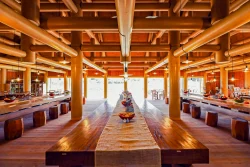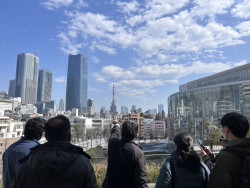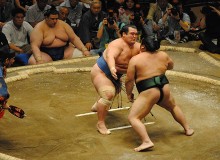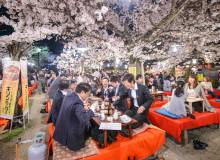
Originally published on metropolis.co.jp on October 2009
I just got back from a trip to New York and Seoul, both huge cities with extensive train systems and world-class nightlife. Whenever I visit those places and go out late with friends, I never worry about getting home. If it’s too far to walk and we can’t catch a train or a bus, there are always taxis.
But, of course, when I am back in Tokyo, it’s a different situation entirely. The city’s vast area coupled with its expensive taxis mean that either I make sure I get that elusive last train home or I plan on spending the night out.
I say “elusive” because whenever I try to rely on catching the shuden, I always seem to miss it. Tokyo’s combined train and subway system is, after all, the most extensive metropolitan railway in the world, and because each station’s last train is at a different time, the exact timing and route can be as unique as some of the otaku walking around Akihabara.
Even if you make the train, it’s pretty much guaranteed to be packed. Watching exasperated platform attendants trying to squeeze way-to0- many people onto a car in Shibuya after the doors haven’t been able to close for the tenth time because some guy’s briefcase just won’t quite fit is quite humorous—unless, of course, you yourself are also trying to get on that train.
All of this makes me wonder: why is there even a last train to begin with? Why not run the system continuously?
No doubt economics is an issue—trains are expensive to operate, and in the wee hours, when ridership is minimal, JR and other lines might lose money on their routes. But if that’s the case, why not just do what NYC does and reshuffle the system so that the central lines with the highest ridership remain in operation? Aside from late-night revelers, there are plenty of people who work night shifts—nurses, police, shopkeepers, airport workers, financial traders, and so on. In that way, providing 24-hour service would actually economically support productive activity. Even if the train company didn’t make a lot of money, leaving some lines open would seem to be of overall benefit to society. As it is, JR already runs not-so-profitable daytime routes in some regions just for this very reason.
But like beauty, “social benefits” are a function of one’s perception. I spoke to several of my Japanese friends about it, and was surprised by their consensus that the last-train system is actually a good thing for social order. As the thinking goes, by creating a functional curfew, the shuden forces society’s most valued members—salarymen, students and single women—to go home by a certain time. In other words, the last train is a statement on national morality.
Hmm. For a country where social respect is dependent on how early one takes out the garbage, I can see a certain logic in this argument. But what about the social vices that are encouraged, at least in part, by the existence of the last-train system? What about the all-night bars where the salarymen who didn’t make the shuden can drink till dawn? What about the internet cafes where students can read manga while getting tweaked-out on caffeine and cigarettes, only catching a few hours of fitful sleep because they couldn’t make it home? And don’t even get me started on the love hotels…
You see, I have increasingly come to believe that, as odd as it sounds, some people actually like “missing” the last train because it gives them an excuse to stay out. Perhaps this is, at least inadvertently, another one of those Japanese social devices, often difficult for Westerners to understand, that serves to create a “face-saving” out for otherwise unacceptable behavior: “The last train made me do it!”

Illustration by Eparama Tuibenau
On the other hand, maybe it really is just all about the money. Let’s say that the last train system were to be abolished. What would happen to all the bars, internet cafes and love hotels? Their business would probably fall off a cliff. I don’t know about Japan, but at least in special-interest-based America, you could bet the “love hotel lobby” would be doing their best to keep JR from running all night. The cynical side of me wonders if something similar is afoot here.
Maybe those of us who really want to see the enactment of a 24-hour system should form our own group to promote all-night trains as the morally and economically sensible thing to do. For example, we could propose a 50 percent surcharge on fares after midnight and use the proceeds for a socially responsible cause, like education. Now all we need is a clever name for our lobby.







